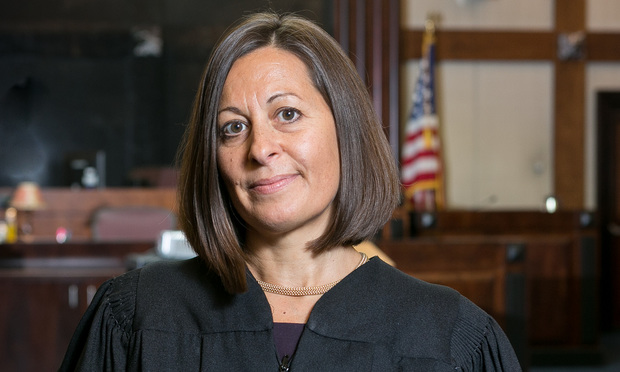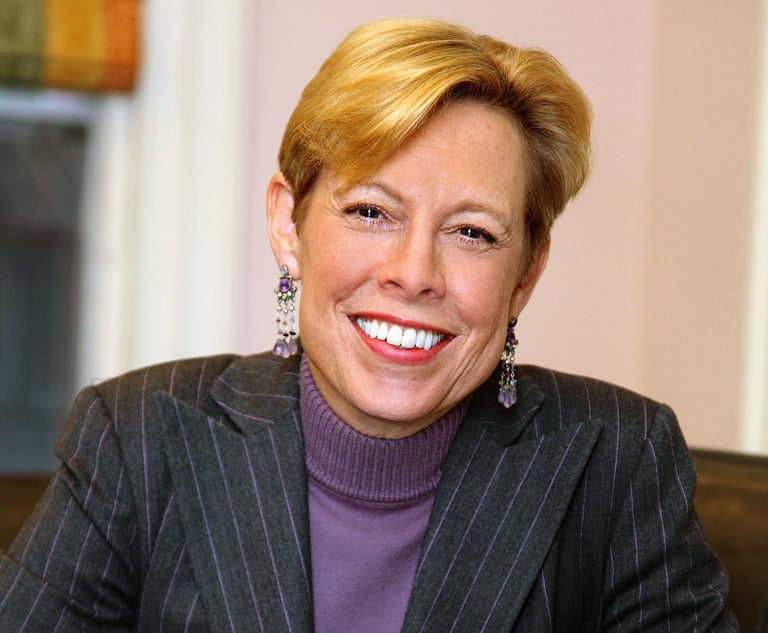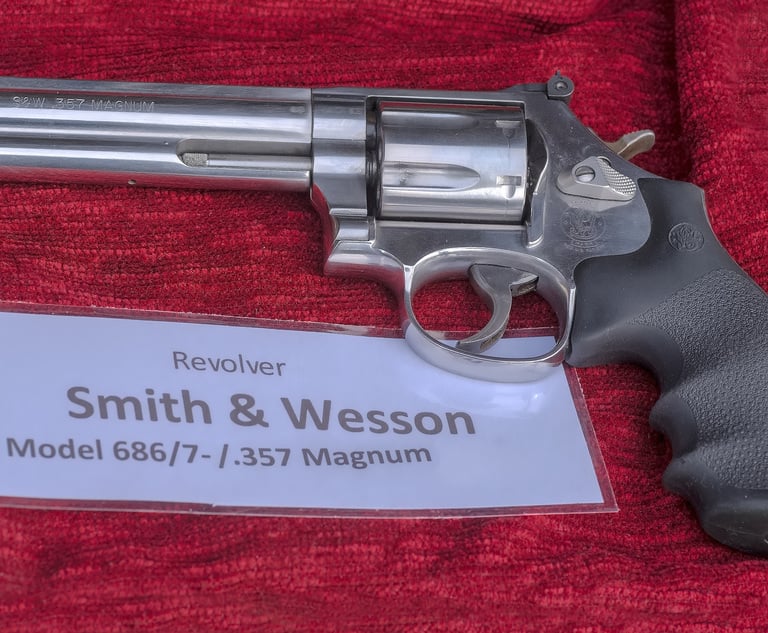In Patent Quota Suit, Emails Between L'Oreal's US General Counsel and Parent Company Held Privileged
"[T]he fact that the attorney and client do not work for the same L'Oreal entity is of no moment," Judge Leda Dunn Wettre wrote.
January 07, 2020 at 02:42 PM
4 minute read
 Leda Dunn Wettre, U.S. magistrate judge for the District of New Jersey/photo by Carmen Natale
Leda Dunn Wettre, U.S. magistrate judge for the District of New Jersey/photo by Carmen Natale
A former patent attorney for L'Oreal USA has been dealt a discovery setback in his legal battle with the company over an alleged patent application quota system.
Steven Trzaska's application to compel production of a chain of email messages discussing his case was denied Monday by U.S. Magistrate Judge Leda Dunn Wettre of the District of New Jersey.
Trzaska filed the suit in 2015, claiming he and his fellow patent lawyers were told in 2014 that they faced dismissal if they did not meet the quota of 40 patent applications filed annually.
In seeking discovery of the emails, Trzaska claimed that attorney-client privilege did not apply to the messages between Thomas Sarakatsannis, general counsel of L'Oreal USA, and Jean-Francois Pahin, CFO of the research and innovation division at L'Oreal's parent company in France, because they work for separate business entities.
But Wettre said members of a corporate family are joint clients, and it made no difference whether their in-house counsel worked for the parent company or a subsidiary. "[T]he fact that the attorney and client do not work for the same L'Oreal entity is of no moment," Wettre wrote in a decision Monday.
Trzaska sought production of three messages that were exchanged between Sarakatsannis and Pahin in November 2014, or, in the alternative, an in camera review of the messages. In response to a request from Wettre for additional information about the emails, beyond the notations in L'Oreal's privilege logs, lawyers for L'Oreal and its U.S. subsidiary said Sarakatsannis and Pahin discussed severance negotiations with Trzaska and potential legal claims and risks that might arise if his employment were terminated. The emails included in the subject line a note that Sarakatsannis and Pahin intend their communications to be attorney-client privileged.
"Beyond the fact that Mr. Sarakatsannis' job as in-house counsel is to advise members of the L'Oreal corporate family on business and legal matters within his purview, he and Mr. Pahin manifested their understanding of their attorney-client relationship by marking the subject line of the three e-mails 'Attorney-Client Privileged,'" Wettre wrote.
In addition, there were no other participants in the emails, and neither defendant has otherwise disclosed their content, Wettre said. Also, their counsel proffered that the emails contain legal advice from Sarakatsannis to Pahin following Trzaska's threat of legal action against L'Oreal USA and L'Oreal S.A., Wettre said.
"Plainly, the attorney-client privilege applies," she said.
Wettre also rejected Trzaska's assertion that an in camera review of the emails was warranted because they might be business communications, and not legal communications. The timing of the creation of the emails—shortly after Trzaska threatened legal action against L'Oreal USA and L'Oreal S.A.—"is telling, and plaintiff has not put forth any cause to doubt defense counsels' representations that the information contained therein was conveyed for a primarily legal purpose," Wettre wrote.
Trzaska claims in his suit that after he told Pahin that he and the company's other patent attorneys were not willing to file low-quality patents merely to meet a quota, Trzaska was notified that the company would give him 15 weeks' severance pay if he would resign. He declined, and the offer was later raised to 40 weeks of severance pay, the suit claimed. When he declined to resign a second time, he was terminated, the suit claimed.
A lawyer for Trzaska said L'Oreal's exposure in the case is "heavy" because Trzaska, 52 when he filed the suit, earned roughly $400,000 per year and could have reasonably looked forward to another 15 years of work.
In November 2015, U.S. District Judge Susan Wigenton dismissed the case, finding its allegations that L'Oreal's policies caused staff attorneys to violate the Rules of Professional Conduct were not an adequate basis for a whistleblower suit. But the U.S. Court of Appeals for the Third Circuit reinstated the case in July 2017, ruling that an employer's threat that would result in the disregard of obligatory professional standards violates a public policy mandate under the whistleblower law.
Harold Goodman of Raynes Lawn Hehmeyer in Philadelphia, representing Trzaska, and Rosemary Alito of K&L Gates in Newark, representing L'Oreal USA, did not return calls about the ruling.
Eric Savage of Littler Mendelson in Newark, representing parent company L'Oreal S.A., declined to comment on the ruling.
This content has been archived. It is available through our partners, LexisNexis® and Bloomberg Law.
To view this content, please continue to their sites.
Not a Lexis Subscriber?
Subscribe Now
Not a Bloomberg Law Subscriber?
Subscribe Now
NOT FOR REPRINT
© 2025 ALM Global, LLC, All Rights Reserved. Request academic re-use from www.copyright.com. All other uses, submit a request to [email protected]. For more information visit Asset & Logo Licensing.
You Might Like
View All

Class-Action Suit Filed Against Jaguar for Claims of Defective Windshields in Land Rover Defender

Fortune 500 Company Sues Metals Supplier Alleging It Used Proprietary Info Obtained During Bidding Process to Poach Talent

In Split Ruling, 3rd Circuit Declines to Halt Consumer Fraud Probe of Gunmaker
5 minute readLaw Firms Mentioned
Trending Stories
- 1We the People?
- 2New York-Based Skadden Team Joins White & Case Group in Mexico City for Citigroup Demerger
- 3No Two Wildfires Alike: Lawyers Take Different Legal Strategies in California
- 4Poop-Themed Dog Toy OK as Parody, but Still Tarnished Jack Daniel’s Brand, Court Says
- 5Meet the New President of NY's Association of Trial Court Jurists
Who Got The Work
J. Brugh Lower of Gibbons has entered an appearance for industrial equipment supplier Devco Corporation in a pending trademark infringement lawsuit. The suit, accusing the defendant of selling knock-off Graco products, was filed Dec. 18 in New Jersey District Court by Rivkin Radler on behalf of Graco Inc. and Graco Minnesota. The case, assigned to U.S. District Judge Zahid N. Quraishi, is 3:24-cv-11294, Graco Inc. et al v. Devco Corporation.
Who Got The Work
Rebecca Maller-Stein and Kent A. Yalowitz of Arnold & Porter Kaye Scholer have entered their appearances for Hanaco Venture Capital and its executives, Lior Prosor and David Frankel, in a pending securities lawsuit. The action, filed on Dec. 24 in New York Southern District Court by Zell, Aron & Co. on behalf of Goldeneye Advisors, accuses the defendants of negligently and fraudulently managing the plaintiff's $1 million investment. The case, assigned to U.S. District Judge Vernon S. Broderick, is 1:24-cv-09918, Goldeneye Advisors, LLC v. Hanaco Venture Capital, Ltd. et al.
Who Got The Work
Attorneys from A&O Shearman has stepped in as defense counsel for Toronto-Dominion Bank and other defendants in a pending securities class action. The suit, filed Dec. 11 in New York Southern District Court by Bleichmar Fonti & Auld, accuses the defendants of concealing the bank's 'pervasive' deficiencies in regards to its compliance with the Bank Secrecy Act and the quality of its anti-money laundering controls. The case, assigned to U.S. District Judge Arun Subramanian, is 1:24-cv-09445, Gonzalez v. The Toronto-Dominion Bank et al.
Who Got The Work
Crown Castle International, a Pennsylvania company providing shared communications infrastructure, has turned to Luke D. Wolf of Gordon Rees Scully Mansukhani to fend off a pending breach-of-contract lawsuit. The court action, filed Nov. 25 in Michigan Eastern District Court by Hooper Hathaway PC on behalf of The Town Residences LLC, accuses Crown Castle of failing to transfer approximately $30,000 in utility payments from T-Mobile in breach of a roof-top lease and assignment agreement. The case, assigned to U.S. District Judge Susan K. Declercq, is 2:24-cv-13131, The Town Residences LLC v. T-Mobile US, Inc. et al.
Who Got The Work
Wilfred P. Coronato and Daniel M. Schwartz of McCarter & English have stepped in as defense counsel to Electrolux Home Products Inc. in a pending product liability lawsuit. The court action, filed Nov. 26 in New York Eastern District Court by Poulos Lopiccolo PC and Nagel Rice LLP on behalf of David Stern, alleges that the defendant's refrigerators’ drawers and shelving repeatedly break and fall apart within months after purchase. The case, assigned to U.S. District Judge Joan M. Azrack, is 2:24-cv-08204, Stern v. Electrolux Home Products, Inc.
Featured Firms
Law Offices of Gary Martin Hays & Associates, P.C.
(470) 294-1674
Law Offices of Mark E. Salomone
(857) 444-6468
Smith & Hassler
(713) 739-1250






